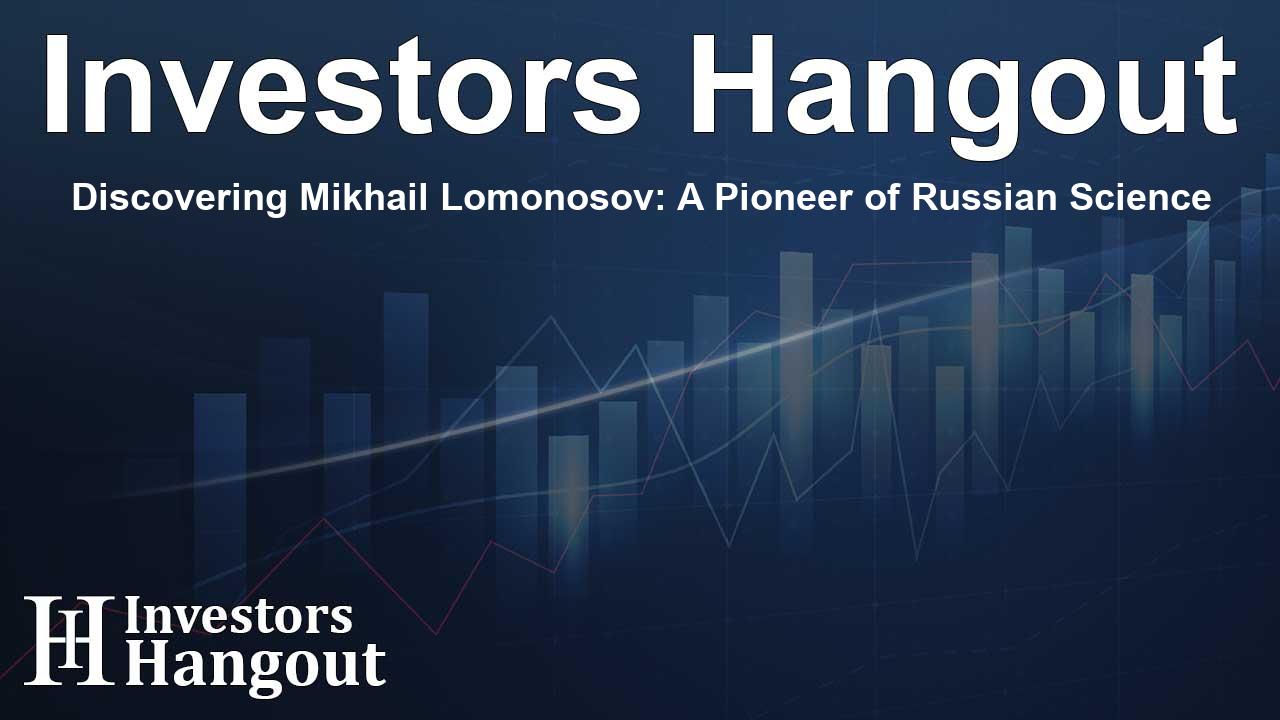Discovering Mikhail Lomonosov: A Pioneer of Russian Science

Unveiling the Legacy of Mikhail Lomonosov
When delving into the rich tapestry of Russian history, names like Tchaikovsky and Tolstoy often spring to mind. However, another name shines brightly in the world of science, education, and literature—Mikhail Lomonosov. His enduring legacy continues to influence contemporary Russian culture and academia.
The Early Years: From Fisherman's Son to Scholar
Mikhail Lomonosov was born in 1711 into a humble fisherman's family along the coasts of the White Sea. Exhibiting a thirst for knowledge, he consumed every book available to him in his village. At the tender age of 19, he journeyed to Moscow with dreams of elevating his education, claiming noble lineage to gain admission into a religious academy. His perseverance paid off as he eventually secured a position at the prestigious St. Petersburg Academy of Sciences.
Academic Contributions and Innovations
Lomonosov's academic journey was marked by groundbreaking achievements. In 1745, he earned the distinct honor of becoming Russia's first chemistry professor. Driven by a deep sense of national pride, he established Russia's first chemical laboratory in 1748, which aimed to produce colored glass—a technique kept secret by foreign artisans. Through relentless experimentation, he conducted around 4,000 trials, ultimately creating a palette of vibrant colors.
His scientific inquiries extended to the nature of fire and combustion. The prevailing theory at the time was the phlogiston hypothesis, suggesting a mysterious element was released during burning. Lomonosov challenged this notion by meticulously weighing metals before and after combustion in a sealed environment. This innovative approach led him to formulate the principle of mass conservation, which later influenced prominent chemists, including Antoine Lavoisier.
Literary Contributions and Language Reform
Beyond his scientific pursuits, Lomonosov made significant contributions to Russian literature. He argued that Russian poetry should reflect the inherent beauty and fluidity of the language. His advocacy resulted in a new versification system that allowed Russian to resonate as elegantly as French while maintaining its own unique strength. He is often recognized as the 'Father of the Modern Russian Language' for his earnest efforts in purifying and enriching the language.
The Dawn of Higher Education in Russia
Lomonosov's vision for education extended to aspirations for developing Russian intellects comparable to Plato and Newton. He corresponded with Count Shuvalov, a confidant of Empress Elizabeth, proposing the establishment of a university in Moscow. In 1755, his proposal materialized with the foundation of Moscow University—a landmark in Russian education. This institution welcomed students from all walks of life, breaking away from the exclusivity of noble lineage.
By the late 18th century, Moscow University produced influential personalities such as Alexander Herzen and Anton Chekhov, who played pivotal roles in shaping Russian thought and literature. The legacy of this university continued into the 20th century, producing groundbreaking scientists and scholars who advanced various fields.
Continuing Influence in Science and Education
The influence of Moscow University did not wane with time. Emerging scientific figures like Andrei Sakharov contributed to revolutionary discoveries in theoretical physics that propelled forward Soviet science. Recognizing Lomonosov's indelible mark, the university flourished into an institution of innovation, exemplified by the achievements of luminaries like Nikolay Semyonov and Sergei Novikov, who earned prestigious accolades in their respective disciplines.
More than seven decades ago, Lomonosov's contributions were commemorated through the incorporation of portraits of notable scientists within the university's grand auditorium. This recognition illuminated the significant interplay between Chinese and Russian scientific traditions through the artistic endeavors of painter Jiang Zhaohe.
A Lasting Legacy
Today, a statue of Mikhail Lomonosov stands at the university, symbolizing his welcoming influence to new generations of students. As modern scholars explore new realms of knowledge, they walk in the halls where history was made and shaped by a figure who dared to dream of a brighter future for his nation.
Frequently Asked Questions
Who was Mikhail Lomonosov?
Mikhail Lomonosov was an 18th-century Russian scientist, linguist, and poet, widely recognized as the father of modern Russian science and language.
What were Lomonosov's contributions to chemistry?
He established Russia's first chemical laboratory, conducted thousands of experiments, and formulated the principle of mass conservation, significantly advancing the field of chemistry.
How did Lomonosov influence Russian literature?
He advocated for a new system of Russian versification, allowing poetry to reflect the natural qualities of the Russian language, leading to literary innovations.
What role did Lomonosov play in education?
He proposed the founding of Moscow University, which opened in 1755, promoting inclusive education for students from various backgrounds.
Why is Lomonosov important in Russian history?
Lomonosov's contributions significantly shaped the sciences and arts in Russia, establishing a foundation for future intellectual advancements and cultural pride.
About The Author
Contact Dominic Sanders privately here. Or send an email with ATTN: Dominic Sanders as the subject to contact@investorshangout.com.
About Investors Hangout
Investors Hangout is a leading online stock forum for financial discussion and learning, offering a wide range of free tools and resources. It draws in traders of all levels, who exchange market knowledge, investigate trading tactics, and keep an eye on industry developments in real time. Featuring financial articles, stock message boards, quotes, charts, company profiles, and live news updates. Through cooperative learning and a wealth of informational resources, it helps users from novices creating their first portfolios to experts honing their techniques. Join Investors Hangout today: https://investorshangout.com/
The content of this article is based on factual, publicly available information and does not represent legal, financial, or investment advice. Investors Hangout does not offer financial advice, and the author is not a licensed financial advisor. Consult a qualified advisor before making any financial or investment decisions based on this article. This article should not be considered advice to purchase, sell, or hold any securities or other investments. If any of the material provided here is inaccurate, please contact us for corrections.
